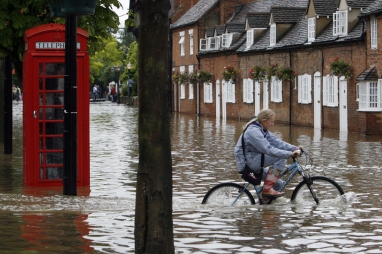
Government must act now to avoid impacts of climate change says climate committee
Government needs to act fast to keep the UK’s emissions reductions on track and to adapt to climate change, the Committee on Climate Change has said.
Many policies designed to reduce future emissions are due to expire over the course of this Parliament, it pointed out in a new report. This includes funding for low-carbon electricity and heat, measures to encourage low-emission vehicle use and energy efficiency.
Uncertainty created by the lack of policies after 2020 will lead to stop-start investment, higher costs for all and risks failing to meet legal obligations to reduce emissions, the committee said in its 2015 progress report to Parliament – “Reducing emissions and preparing for climate change”.
"Acting early will help to reduce costs to households, business and the Exchequer. It will improve people’s health and wellbeing and create opportunities for business in manufacturing and in the service sector” - Lord Deben
The UK also needs to prepare for the impacts of climate change caused by continuing emissions, the committee said. Its evaluation of the UK National Adaptation Programme concluded that more households will be at high risk of flooding despite the increase in spending on flood defence. In addition, farming in some of the most productive parts of the country is at risk from floodwater within a generation, and higher temperatures pose risks to health that are not being properly addressed.
The Committee’s new progress report is published half way through a crucial year for global climate action. 196 nations will meet in Paris in December to agree a new international deal to limit global warming.
The Committee is advising Government to:
- extend funding for low-carbon electricity generation to 2025, to support investment and innovation and to continue cutting costs
- agree an action plan that delivers low-carbon heat and energy efficiency to allow homes to be heated for less while addressing the risks from rising temperatures and flooding
- continue support for efficient, low-emission vehicles to save drivers money
- develop new infrastructure that helps to combat climate change and is resilient to its impacts
- act to preserve the fertility and organic content of soils and counter the decline in productive farmland.
“This Government has a unique opportunity to shape climate policy through the 2020s. It must act now to set out how it plans to keep the UK on track. Acting early will help to reduce costs to households, business and the Exchequer. It will improve people’s health and wellbeing and create opportunities for business in manufacturing and in the service sector,” said chair of the committee Lord Deben.
The report has been published a week ahead of the emergency Budget on 8 July and two months after the Institution of Civil Engineers called on Government not to cut flood defence funding.
“Fears around the resilience of our infrastructure networks in the face more frequent extreme weather, echo our own concerns,” said ICE director general Nick Baveystock. “There is a growing need for a more comprehensive approach to UK resilience, one that better reflects interdependencies - or the “domino effect” where the failure of one system such as a flood defence affects the operation of the other networks.
“We would like to see Government put resilience at the heart of its plans, and the upcoming Budget presents an opportunity.”